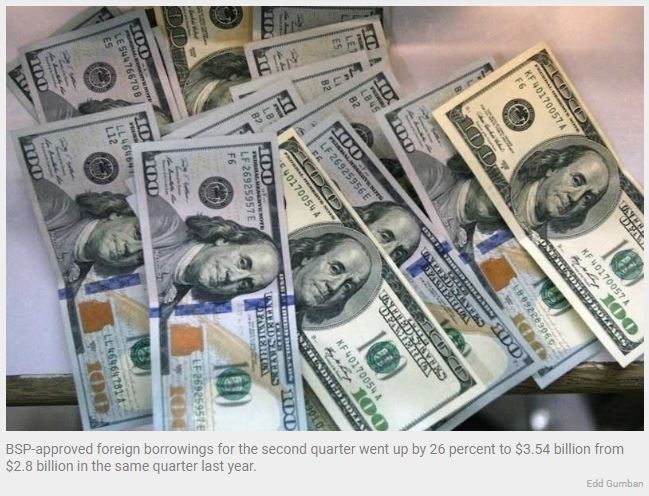Philippines: Foreign borrowings surge 48% to $8.3 billion in 1st half
MANILA, Philippines — Foreign borrowings approved by the Bangko Sentral ng Pilipinas (BSP) surged by 48 percent to $8.34 billion in the first half from $5.64 billion in the same period last year as the government tapped the offshore debt market to raise funds for its financing requirements and its pandemic response measures.
BSP-approved foreign borrowings for the second quarter went up by 26 percent to $3.54 billion from $2.8 billion in the same quarter last year.
The borrowings approved by the BSP from April to June included the government’s Japanese yen-denominated or Samurai bond issuance equivalent to about $513.41 million, three project loans amounting to $2.16 billion and three program loans worth $869.72 million.
Of the amount, a total of $869.72 will be used to fund the government’s pandemic response and recovery, including vaccine procurement and continuing requirements in light of the global health crisis, while $513.41 million will be for general financing requirements.
Likewise, the BSP said $1.75 billion borrowed from the Asian Development Bank would help partially bankroll the $4.3 billion South Commuter Rail project and another $405.99 million would finance bridge projects.
In the first quarter, the Philippines braved the volatile global credit market and raised $2.25 billion from its offshore commercial borrowing that included the maiden $1 billion issuance of green bonds.
From January to March, the BSP also approved three project loans worth $2.55 billion. During the period, the amount raised would also be used to fund a transportation project with $2.08 billion, COVID response measures with $300 million, and another infrastructure project with $175.1 million.
All foreign loans to be contracted or guaranteed by the government need prior BSP approval under Section 20, Article VII of the 1987 Constitution.
Likewise, all foreign borrowing proposals by the national government, government agencies and government financial institutions have to be submitted for approval-in-principle by the Monetary Board before commencement of actual negotiations, as mandated under Letter of Instruction 158 issued in January 1974.
According to the BSP, it promotes the judicious use of resources and ensures that external debt requirements are at manageable levels, to support external debt sustainability.
Last year, foreign borrowings approved by the BSP declined by 26 percent to $13.1 billion from $17.7 billion in 2020. The Philippines borrows heavily from foreign and domestic creditors to finance the country’s budget deficit as it spends more than what it actually earns.
The country’s budget shortfall ballooned to a record P1.67 trillion in 2021 as the pandemic-induced recession pulled down revenue collections, while spending soared to finance COVID response measures.
Source: https://www.philstar.com/business/2022/07/19/2196333/foreign-borrowings-surge-48-83-billion-1st-half


 Thailand
Thailand




